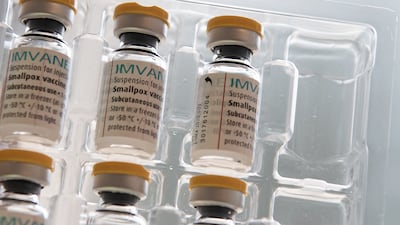Africa still does not have a single dose of a monkeypox vaccine, even though it is the only continent to have documented deaths from the disease that has been designated a global emergency, its public health agency announced Thursday.
Within the past week, the World Health Organisation declared monkeypox an “extraordinary” situation that qualifies as a global health emergency.
“Let us get vaccines on to the continent,” Ahmed Ogwell, the acting head of the Africa Centres for Disease Control and Prevention, said in a weekly media briefing. He described a situation where the African continent of 1.3 billion people was again being left behind in access to doses in an uncomfortable echo of the Covid-19 pandemic.
To date, more than 20,000 cases have been reported in 77 countries across the world. More than 2,100 monkeypox cases have been recorded in 11 African countries and 75 people have died, the Africa CDC director said.
Although monkeypox has been established in parts of central and West Africa for decades, it was not known to spark large outbreaks beyond the continent or to spread widely among people until May, when authorities detected dozens of epidemics in Europe, North America and elsewhere.
Now the global race is on to obtain monkeypox vaccine doses. The European Commission, the EU’s executive arm, has agreed to buy 160,000 doses of vaccines for the disease. On Wednesday, US health regulators said nearly 800,000 doses of the monkeypox vaccine would soon be available for distribution after what they described as weeks of delays.
Such delays are far more pronounced in Africa, where the painful disease has been endemic in some countries for years.
Dr Ogwell said the Africa CDC had engaged with international partners in attempts to obtain vaccines, and while he said “good news” was expected in the coming days, it was not possible to "give you a timeline”.
Even doses of the smallpox vaccine, which has shown effectiveness against monkeypox, are not available in Africa, Dr Ogwell said.
“The solutions need to be global in nature,” he said, in a warning to the international community. “If we’re not safe, the rest of the world is not safe.”
The Covid-19 pandemic and the global hoarding of vaccine doses served as a jolt to African leaders, who quickly joined forces in an unprecedented effort to obtain doses and establish the production of more vaccines on the continent.
Now, to their dismay, the monkeypox outbreak is again indicating that the world’s richer countries hurry to protect their own people first.
The WHO has said it is creating a vaccine-sharing mechanism for protection against monkeypox, but as the health body has released few details, there is no guarantee that African countries will be prioritised. No countries have yet agreed to share any vaccines with the WHO.
Health officials have emphasised that monkeypox can infect anyone in close contact with a patient, or their contaminated clothing or bedsheets. Researchers are still exploring how it spreads but believe it is mainly through close, skin-to-skin contact and through contact with bedding and clothing touched by an infected person’s rash or body fluids.
In Africa, monkeypox mainly spreads to people by infected wild animals such as rodents in limited outbreaks that typically have not crossed borders. In Europe, North America and elsewhere, however, monkeypox is spreading among people with no links to animals or recent travel to Africa.
In the US and Europe, the vast majority of infections have taken place in men who have sex with men, although health officials have stressed that anyone can contract the virus.

